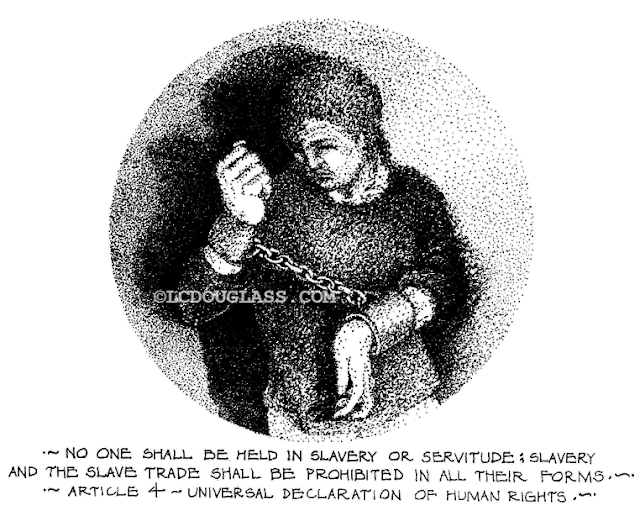An Amnesty International poster image I created in 1989, in idealistic, pre-Photoshop days. Image © LCDouglass. All rights reserved.
The previous post considered how to write the stories of people who become unpersons.
Unpersons journey outside society. The Unperson often (
but not always) travels from a relatively normal or stable existence into non-conformity, alienation, crime (or perceived crime), after which this troubled character encounters judgement and justice. Usually, this is followed by isolation, loss of rights, being silenced or erased, and imprisonment or escape.
This theme in my literary writing grew out of work for Amnesty International. On checking my old files, which contain Amnesty's calls for action from 1989, it was plain that states regularly oppressed particular citizens then, just as they do now.
During that work for Amnesty, there was one call for action that I never forgot. It was graphic: police came for student leaders in their dorms. To escape, one of the students jumped through a glass window. As a student leader at the time, I identified with these people. After some searching, I found the memo. The case occurred in Zimbabwe in October, 1989.
Image Source: Amnesty International / Personal collection. Click to enlarge.
As much as I could portray the journeys of people who walk through society's looking glass and become shadows on the other side, I was equally curious about the
hero's journey back into the mainstream reality.
I considered going through the 1989 calls for action to ask, 'where are they now?' What happened to these people for whom I wrote letters of appeal as a teenager? What happens to the disappeared, the arrested, the persecuted, nearly thirty years on? In this case, the outcomes were interesting.
Morgan Tsvangirai, long-time Zimbabwean opposition leader. Image Source: CNN.
On 6 July 2017, Arthur Mutambara was planning a political comeback with the launch of his book, In search of the Elusive Zimbabwean Dream. The first of three volumes, you can buy it here. Image Source: Chronicle.
After years in opposition against
Robert Mugabe,
Arthur Mutambara and
Morgan Tsvangirai respectively became Deputy Prime Minister and Prime Minister of Zimbabwe. They served under Mugabe in the same term, 2009-2013. Tsvangirai died of cancer on 14 February 2018 at the age of 65. Mutambara, who has a DPhil in Robotics from Oxford,
investigated and
condemned the
abuse of white farmers under Mugabe.
After another arbitrary arrest in June 2008, he declared, "We will triumph over evil."
Enoch Chikweche changed his name to
Munyaradzi Gwisai and became a labour lawyer, Zimbabwean politician, and professor at the University of Zimbabwe. He was a member of the Zimbabwe Parliament from 2000 to 2002.
He was arrested in 2011 on treason charges for watching footage of the Arab Spring.
Although he helped found the opposition
Movement for Democratic Change (MDC) in 1999 with Tsvangirai, he left it never to return, due to ideological differences.
He is the current leader of the International Socialist Organization of Zimbabwe.
Politics in the country remains unstable, with President
Emmerson Mnangagwa surviving an
assassination attempt only yesterday. National elections take place on 30 July 2018.
It is interesting that Mutambara has a doctorate in robotics. I
have previously written on how technological innovation is, by definition, tied to social alienation and leads to massive changes in politics and culture.
One Millennial novelty is that social alienation now combines classic brutal coercion (secret police kicking in your door at three in the morning) with stealthy tactics (tech giants erasing your social media presence). The UK
series
Black Mirror has explored these novelties; the series' writers speculate on how easily technology enables isolation, imprisonment, and enslavement.
But the lesson here is that those who survive this trial by fire and who return to the fold can end up as future leaders. The same holds true for today's social media outcasts, alongside the hackers and whistleblowers, who are being censored and condemned for their radical ideas as they engage with technology in new ways. They may be outsiders now, but their dreams will one day become our reality.








Comments
Post a Comment